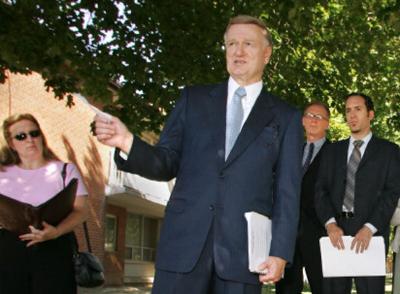A retired ÎÚÑ»´«Ã½ judge, whose courtroom comments have already led to one serious case being overturned, is once again at the centre of an appeal due to his multiple interruptions and calling a defence lawyerâs question âstupidâ in front of the jury during a murder trial.
Lawyers for Emmanuel Owusu-Ansah were before the Ontario Court of Appeal on Thursday arguing that retired Superior Court justice Eugene Ewaschuk displayed a âreasonable apprehension of biasâ by repeatedly interrupting the defenceâs questioning of witnesses, including Owusu-Ansah.
The man was convicted by a jury in 2015 of second-degree murder for fatally stabbing his ex-partner and mother of his children, Bridget Takyi, and burning her body beyond recognition. Ewaschuk sentenced him to life in prison with no chance at parole for 22 years.
Appeal lawyers Nathan Gorham and Breana Vandebeek acknowledged before the three-judge panel on Thursday that their client is at least guilty of manslaughter. They argued in court filings that Ewaschukâs interruptions caused an unfair trial because they âclearly demonstrated the trial judgeâs contempt towards Mr. Owusu-Ansah and his counsel.â
They pushed for either a new trial or a reduction in his sentence. The appeal court will release its decision at a later date.
The top court previously overturned a murder conviction in a different case in 2017 after finding that Ewaschukâs repeated interruptions during a witnessâs testimony to the jury went over the line, and that a reasonable person would have concluded the judge âhad cast his lot with the prosecution.â
While itâs not uncommon for judges to interrupt during a trial, especially to get clarification, Owusu-Ansahâs appeal lawyers argued that the sheer number of Ewaschukâs interventions âis problematic and likely unprecedented.â They said he interrupted defence lawyer Scott Reid with an âunrelenting nature,â including about 70 times during cross-examination of an expert and, âon a conservative estimate,â about 71 times during the questioning of Owusu-Ansah.
âI would urge this court to find that these were not helpful interventions for clarification,â Gorham told the appeal judges. âThey do cast an unfortunate pall of a reasonable apprehension of bias over the proceedings.â
The Crown acknowledged that there were a lot of interruptions but argued they were mostly appropriate, describing Ewaschuk in court filings as an âexperienced and activist jurist who wanted to get to the point of every witness.â Crown attorney Alexander Alvaro said Thursday that he accepted some of the interventions were âcontentiousâ but argued that when considering the trial as a whole, there was no appearance of unfairness.
One of the main interruptions happened when Reid was questioning Owusu-Ansah and trying to get to his state of mind at the time of Takyiâs killing. He had received anonymous text messages in the months prior, threatening to have him arrested and deported, and he believed Takyi had been sending them. When Reid asked Owusu-Ansah whether he believed the sender would carry out those threats, Ewaschuk interrupted and said it was obvious the person didnât have the power to arrest or deport him.
Reid responded that his question was whether Owusu-Ansah believed the person would be able to do it, and Ewaschuk said in front of the jury: âItâs a stupid question.â Reid replied: âPardon me?â to which Ewaschuk again said: âItâs a stupid question.â When Reid asked for the jury to be excused, the judge said no.
The next day in the juryâs absence, Reid asked for a mistrial, but the judge refused and again stated that the question was stupid. When the jury returned, Ewaschuk apologized for calling the question stupid, adding he should have described the question as âimproper.â (Gorham argued Thursday that even that was wrong, and that the question was relevant to the defenceâs case.)
The appeal team argued that Ewaschuk also erred by admitting evidence that included a videotaped statement by Takyi to police reporting an alleged assault by Owusu-Ansah. The defence at trial said the evidence was âprejudicial and unreliable,â but the appeal team said Ewaschuk admitted it without doing a proper analysis. Instead, he made a point of referring to what the media might think of his decision during arguments on the issue.
âRosie DiManno and Christie Blatchford would (skewer) me on high if I were to exclude that evidence,â Ewaschuk said.
DiManno is a ÎÚÑ»´«Ã½ Star columnist; Blatchford was a Postmedia columnist who died in 2020.
âThe judge was concerned about what Rosie DiManno might say,â Gorham said Thursday, arguing the judgeâs analysis of whether to admit the evidence âdidnât unfold in the way it should have.â




























To join the conversation set a first and last name in your user profile.
Sign in or register for free to join the Conversation